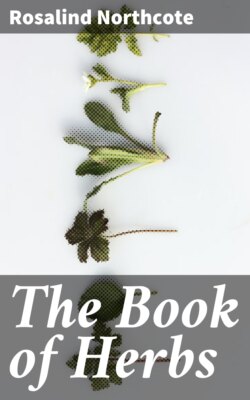Читать книгу The Book of Herbs - Rosalind Northcote - Страница 7
На сайте Литреса книга снята с продажи.
Balm (Melissa officinalis).
ОглавлениеTable of Contents
The several chairs of order look you scour
With juice of Balm and every precious flower.
Merry Wives of Windsor, V. v. 65.
Then Balm and Mint helps to make up
My chaplet.
The Muses Elysium.—Drayton.
My garden grew Self-heal and Balm,
And Speedwell that’s blue for an hour,
Then blossoms again, O, grievous my pain,
I’m plundered of each flower.
Devonshire Song.
The lemon-scent of Balm makes it almost the most delicious of all herbs, and it is for its fragrance that Shakespeare and Drayton have alluded to it in these passages. In the song it is mentioned for another reason, for the flowers here are used as emblems. The first verse describes a garden of fair blossoms stolen, alas! from their owner. This verse of the song shows she has planted flowers whose nature is to console—Self-heal, Balm and the Speedwell, which, after every shock, hasten to bloom again, but she is again bereft of her treasures, and finally despairs and tells us that she grows naught but weeds and the symbols of desolation. There was once a “restorative cordial” called Carmelite water, which enjoyed a great reputation, and which was composed of the spirit of Balm, Angelica root, lemon-peel and nutmeg. In the early part of the last century, Balm wine was made, and was described as being “light and agreeable,” but now Balm is seldom used, except when claret-cup is improved by its flavour. A most curious legend is told by Aubrey[7] of the Wandering Jew, the scene being on the Staffordshire moors. “One Whitsun evening, overcome with thirst, he knocked at the door of a Staffordshire cottager, and craved of him a cup of small beer. The cottager, who was wasted with a lingering consumption, asked him in, and gave him the desired refreshment. After finishing the beer, Ahasuerus asked his host the nature of the disease he was suffering from, and being told that the doctors had given him up, said, ‘Friend, I will tell thee what thou shalt do.’ He then told him to go into the garden the next morning on rising, and gather three Balm leaves, and to put them into a cup of small beer. He was to drink as often as he needed, and refill the cup when it was empty, and put in fresh Balm leaves every fourth day, and, ‘before twelve days shall be past, thy disease shall be cured and thy body altered.’ So saying, and declining to eat, he departed and was never seen again. But the cottager gathered his Balm-leaves, followed the prescription of the Wandering Jew, and before twelve days were passed was a new man.”
[7] “Miscellanies.”
